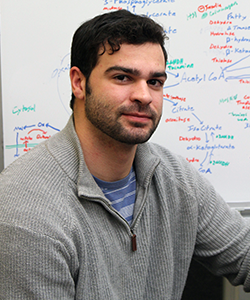

 |
||
|
A graduate student who thrives on being challenged and making a difference
Joseph McCafferty, an M.S. student in the GSBMS, caught the science bug early. He got his first microscope at age five and took one of the nation’s only high-school level neuroscience classes as an elective and “aced” the course. His teacher, a Ph.D. in neuroscience, was so inspiring McCafferty didn’t think twice when choosing neuroscience as his major at Bucknell University. Today, McCafferty is still “acing” his workload in the GSBMS while he works nearby at the New York-Presbyterian/Westchester Division in White Plains, and awaits decisions on his applications to medical schools.
Tell us what led you to New York Medical College:
NYMC’s flexible curriculum and evening classes were a huge draw. They allow me to continue clinical work with patients while still advancing my studies. Plus, the New York region has so many top-tier institutions to choose from. I was able to get a job at New York-Presbyterian, in one of the nation’s top psychiatric divisions, and it’s just a ten-minute car ride away. Working with patients there while I complete my M.S. is preparing me for medical school in a multitude of ways. And since I’m trying hard not to deny myself a social life, being close to the attractions of New York City is quite the added bonus.
What is a typical day like for you?
I don’t have too many typical days since my schedule varies almost every day between classes, work commitments, student government, and making an effort to stay fit. I can say my best days are when I get through a really challenging exam (and feel pretty good about how I did!) and go straight from campus to see patients at the hospital. And even though it can be daunting to see a steady stream of new patients being admitted, it is tremendously gratifying to see patients I’ve had a part in helping get ready for discharge. It makes all the hard work and sacrifice worth it.
Tell us a bit about your personal journey.
Throughout college I worked on numerous research teams, a functional MRI study on Autism spectrum disorders, another MRI study on sports concussions in collegiate athletes, and an independent study on alcohol metabolites and addiction, which I presented at the Society for Neuroscience in 2015. After graduating from Bucknell, I spent a year working clinically at McClean Hospital in Massachusetts, an affiliate of Harvard Medical School. McClean is one of the oldest and most respected psychiatric hospitals in the country so it was a true privilege to be part of the team there. It was my first hands-on clinical experience working with people living with psychiatric disorders. That year-long experience was the most influential of my life—it really solidified my goal and determination to become a physician.
Are you challenged working in a psychiatric unit?
A lot of mental health professionals struggle with the clinical challenges, finding it very emotionally draining. You can see it in the high turnover. I try to keep my focus on how I am helping patients get better. In my time working in psychiatry, I have encountered some of the brightest and most interesting individuals in my life, and I believe it is important to focus on the positive aspects of what may seem like a bleak situation. I am given the opportunity to help people in some of the darkest times of their lives, and while it can be a challenge, it is one that I do not shy away from.
What NYMC faculty member has had the greatest impact on your education and why?
That is an easy question to answer: Dr. Ken Lerea [Kenneth M. Lerea, Ph.D., associate professor of cell biology and anatomy and program director of the interdisciplinary basic medical sciences traditional track] whom I met prior to my decision to attend NYMC and later became my advisor. I found Dr. Lerea to be incredibly honest and open about what to expect as a student; he never tried to sell me. He cared much more about making sure NYMC was the right fit for me, which it has been. As a professor, Dr. Lerea is always pushing his students to hone their critical thinking skills, to put information into context and see the big picture. He’s not just looking for rote memorization of facts. Medicine is getting more complex every day, and I feel like these skills will help me in medical school, and long after when I am a practicing physician.
What achievement at NYMC are you most proud of?
As president of the GSBMS Graduate Student Association, I worked with a very engaged team to develop the Snowman Project. This wasn’t a contest to build the best snowman. It was a charitable gift drive that helped make holiday dreams come true for underprivileged kids in New York City. Working in partnership with Sheltering Arms, we had such an overwhelmingly positive response from the students, staff and faculty at NYMC and were able to provide gifts for 100 children! The response was especially rewarding since everyone was swamped with finals at the time but they still made it happen.
What advice do you have for students entering the GSBMS?
Get involved. There are endless opportunities to learn new things and meet new people. And you’d be surprised how much you can accomplish in a day. I’m always working to improve my time management because I have lots more to do at NYMC—and I only have until spring graduation to get it all done!